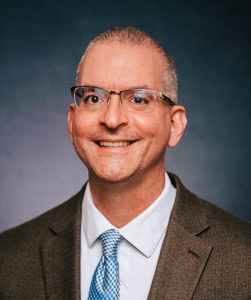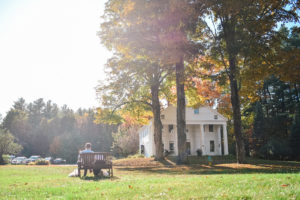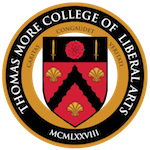By Bridget Ruffing ’22
Dr. Michael Dougherty did not expect to fall in love with philosophy when he began his education at Thomas More College. Nevertheless, the introduction that TMC gave him to the great thinkers of the West left such a deep impression that he decided to shape his entire career around studying and teaching philosophy.
Since graduating in 1995, Dr. Dougherty has accomplished a great deal: He received the Conley Award for outstanding teaching in 2009 from Ohio Dominican University, where he now serves as Philosophy Chair. He has written several books and put the experience he garnered during his TMC Rome semester to good use as Resident Director of the university’s Education Abroad program. All the while, he has continued to regard memories of his undergraduate years with a distinct fondness, cherishing the lessons he learned at TMC both inside and outside the classroom.
Dr. Dougherty currently lives in Gahanna, Ohio, with his wife Michelle and their three children, Thomas, Benedict, and Cecilia. He was gracious enough to answer some questions for us about his experiences.

Dr. Dougherty, you currently hold the Sr. Ruth Caspar Chair in Philosophy at Ohio Dominican University. Can you tell me a bit about what kind of responsibilities this role entails?
Sr. Ruth Caspar, OP was a longtime philosophy faculty member at Ohio Dominican University, and I was pleased to know her. A generous benefactor—one of her former students—endowed the chair, and I am fortunate to honor Sr. Ruth’s legacy through teaching and research. I teach courses every semester both in the Philosophy Department and in the Honors Program. My favorite course to teach is one called Medieval Moral Dilemmas. We read many figures from the Middle Ages in light of important works from contemporary ethical theory. I enjoy this blend of new and old authors. The course comes out of a book I wrote on the subject, Moral Dilemmas in Medieval Thought: From Gratian to Aquinas. I view teaching and scholarship as two ways of understanding the Dominican Motto, which is often rendered as “to contemplate the truth and to share with others the fruits of contemplation.” I have edited new collections of essays on Thomas Aquinas and on Giovanni Pico della Mirandola, and recently I authored two books on academic plagiarism.
You have both an MA from the Catholic University of America and a PhD from Marquette University. Can you tell me a bit about what you studied after your graduation from TMC? What made you decide to pursue graduate studies?
My early plan was to study philosophy because I thought it would serve me well as a preparation for law school. To my surprise, at Thomas More College I quickly learned that I liked philosophy very much, and I never made it to law school. Reading famous philosophers through my four undergraduate years was an exciting experience. Right after graduating, I started studies in philosophy at the Catholic University of America. I had chosen Plato for my junior project at TMC, and so I continued with ancient Greek philosophy by taking several graduate courses on Plato and Aristotle. My two years there were wonderful, but I had to leave due to lack of funding. I was grateful when the philosophy program at Marquette University offered me research and teaching assistantships, and I went on to write a doctoral dissertation on Thomas Aquinas.
 What are some of the rewards of continuing to work within academia? Are there particular challenges you have faced?
What are some of the rewards of continuing to work within academia? Are there particular challenges you have faced?
Well, the major reward is that I get to continue to read great works in philosophy and talk about them with students and colleagues. Texts by Plato, Aristotle, and Aquinas still rank among my favorites to read and teach. Many other TMC graduates have pursued further studies in philosophy. Just last year I was at the annual conference of the American Catholic Philosophical Association held in St. Louis and was delighted to run into two alumni there. I heard someone say “Thomas More College” across a room, so I had to go see who these people were and we had a delightful conversation. I suppose the major challenge for me in academic life is finding enough time to sleep; there is always too much that needs to be read, graded, or written.
Did you find yourself drawing from your experience of TMC’s Rome semester while working as the Resident Director for Ohio Dominican University’s Education Abroad program?
The semester I spent abroad with TMC was life-changing. I boarded the plane and it landed in Rome on my twentieth birthday. I have great memories from visiting St. Peter’s Basilica that day. Later in the semester I attended two papal audiences with Pope John Paul II, and I was blessed to shake his hand. My classmates were so supportive and good to me; I am grateful to them for sustaining such a wonderful community in Rome (and throughout my eight semesters of study at TMC).

Years later, when my wife, Dr. Michelle Dougherty, and I were invited to take students from Ohio Dominican University to Rome for a semester, I couldn’t help but think back to Dr. Paul Connell’s amazing work at TMC. Memories of his intricate tours through the winding streets of the Eternal City provided a model for me as I took my own students to its churches and major architectural highlights.
What are some of the most memorable things you learned from your time in Rome? Has your time there been beneficial to your education and career? If so, in what ways?
It is difficult to put into words the effect that first transformative semester abroad had on me. To live among tangible monuments of ancient Rome and the history of Christianity, while at the same time reading works of philosophy, literature, and theology, provided a full immersion into the wisdom of the past. We didn’t go there as tourists, but as citizens of the Eternal City. I suspect that many of us see Rome as a kind of intellectual home.
What role has your time at Thomas More played in your continued studies? Have you found that your Liberal Arts degree has been useful to you in your role as Philosophy Chair?

I didn’t read too much before I went to TMC, so from day one the immersion in the great books was challenging but rewarding. I was always surrounded by very bright classmates, and they helped me tremendously. I felt seriously underprepared when I started college, but the encouragement from classmates and professors helped me get through my first year. To offer a small example of this: since I had moved to TMC from my home state of Arizona, I was also underprepared for the cold weather. I remember being told by some classmates that I should get a warmer coat. That was good advice.
The classes were excellent, and often the conversations afterward were even better. I am especially grateful for the four semesters I had of ancient Greek. I have vivid memories of struggling through texts from the Gospel of John, Plutarch, and Homer. This background was helpful as I tried to work through Aristotle and Plato during my early semesters of graduate school.
Toward the end of my senior year I finally felt I had figured out how to be a good student, but by then it was time to graduate. I remain grateful to my parents, my classmates, and professors, and also the founders and benefactors of the College who made my undergraduate education possible.
